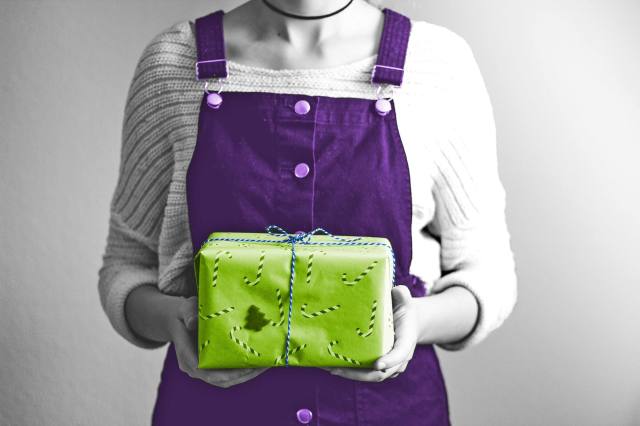
China — Oranges
Offering someone a pair of mandarin oranges is a New Year’s custom in China. It’s unclear how this tradition started, but it could relate to the similarity of the words for “oranges” and “wealth” in the Cantonese dialect, meaning you are symbolically giving someone wealth to start their year. The color of the oranges is also said to symbolize gold.
Egypt — Double-Wrapping Your Gift
In Egypt, giving gifts to business colleagues is common, with the idea that it ensures a good working relationship in the future. Whether you are gifting a box of sweets or a personalized pen, it’s important that the gift be wrapped well — typically in plain-colored paper first, and then in a bright color like green. (Be careful what colors you use wrapping gifts in some other cultures, though, since different hues can mean different things.)

Russia — Flowers
A common gift in many cultures, flowers are particularly beloved in Russia. But the gift-giver needs to pay close attention to certain aspects of the bouquet, such as the color and number of flowers. Yellow flowers may suggest unfaithfulness or mourning, while calla lilies symbolize death. And rethink that dozen roses: Russians think that an odd number of flowers is most appropriate for happy occasions and reserve even numbers for funerals.
Kenya — Spitting
While spitting on a gift may seem rude to many people, in some cultures, this is a blessing. Among the Maasai of Kenya, spitting is a sign of reverence and is often done to bless a wedding or the birth of a baby, in addition to being used for gifts. But “ceremonial spitting” is known from various times and places — the Bible even says that Jesus touched a man’s tongue with his own saliva to fix his stutter — so extending the idea to “blessing” a gift makes sense.

U.S., U.K., and Canada — Lottery Tickets
Becoming more popular by the year, scratch-off lottery tickets are often given as small gifts in these countries. Tucked into a birthday card or as a “white elephant” contribution, a lottery ticket is inexpensive, with the possibility of being worth quite a bit. But some frown on this idea, saying it could be detrimental to people with addiction issues and even to family harmony, if a gifted ticket wins big.
Ireland — Refusing the Gift
In Ireland, the recipient of a gift may politely decline it at least once, just as they may say no to their host’s offer of a cup of tea or glass of water. But the second or third time the gift is offered, the recipient accepts it. While this tradition may date back to the Great Famine in the mid-19th century — ensuring that one’s host is not putting themselves out by offering you what little they have — the fact that gift refusal is also found in parts of Asia and elsewhere suggests that saying, “Oh, no, I couldn’t, really,” is perhaps more of a worldwide tradition.
More Interesting Reads

Iceland — Books
If reading by the fire while sipping hot chocolate sounds like your ideal evening, Jólabókaflóðið might be your new favorite holiday. The word translates roughly to “Christmas book flood,” as Icelanders exchange books as gifts on Christmas Eve. The tradition began during World War II, although Iceland has a tradition of valuing books and authors that’s far older. Since paper was not rationed during WWII, Icelanders turned to books for gift-giving. Now, Icelandic booksellers put out a “book bulletin” every year that goes to each household in mid-November. On Christmas Eve, everyone begins reading the books they’ve been given right away.
New Zealand — “Utu” and “Koha”
Among the Māori, who are the Indigenous people of Aotearoa (New Zealand), there is a concept called utu, which is the balance or harmony necessary for a functioning society. The exchange of gifts is driven by utu, or the idea that the gift-giver will receive something equivalent. This custom can be seen in action most often when guests bring a small gift or donation (koha) to the host of a party.

Saudi Arabia — Gold and Silk
We may closely associate these two items with the Middle East, but while gold and silk are appropriate gifts for women in Saudi Arabia, the prophet Muhammad said they are forbidden for Islamic men. But Saudis appreciate all kinds of other gifts, typically bringing back souvenirs for family and friends, even from short trips.
Navajo (Diné) — Turquoise
In many of the Indigenous cultures of North America, giving with the assumption the receiver will reciprocate is the norm, and the richest people are those willing to give away everything they own. One example of unique gift-giving can be seen among the Navajo (called Diné in their own language): the laugh celebration. The first time a Navajo baby laughs, they are given a piece of turquoise — and whoever elicits that first real baby giggle is tasked with hosting a feast for the baby and their family.

Fiji — Whale Teeth
The tooth of a sperm whale is called tabua in traditional Fijian culture. The word translates roughly to “sacred,” and the tabua is powerful and significant, often gifted at weddings or used as a peace offering. Although the tabua was never considered currency itself, necklaces made from these whale teeth appear today on the 50 Fijian dollar note.
Ancient Rome — Wax Fruit and Clay Lamps
One of the most anticipated holidays for the ancient Romans was Saturnalia, celebrated annually the week of December 17 to 23. Connected with the winter sowing season, Saturnalia was a time to let loose — even enslaved people were temporarily free to say and do what they wanted. People also gave each other small gifts called sigilla in a “white elephant” kind of game. Sigilla included small wax figurines of various deities or replicas of fruit, as well as ceramic oil lamps, which would have been useful in the darker days of the year. With the rise of Christianity in the waning days of the Roman Empire, many of the traditions of Saturnalia were eventually incorporated into Christmas and New Year’s celebrations.











